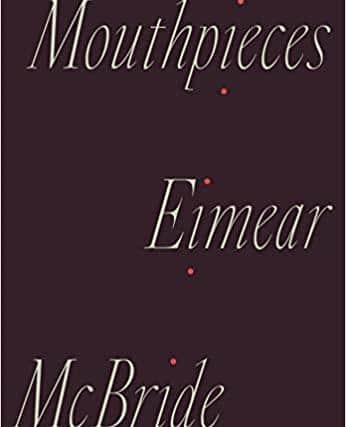Book review: Mouthpieces, by Eimear McBride


Mouthpieces is the kind of book which you have to earn the right to write. Priced at a modest £3.99, it collects three – well, short pieces says the jacket-flap, but one might just as well call them playlets or dramatic shorts or tableaux for voices or five-finger études. In total, the text takes up 30 pages more or less, out of 40. But do not confuse its brevity of extent with a lack of intensity. These are powerful, disorientating works that benefit from the fact that the reader can loop back round and re-read each of them immediately.
McBride certainly has the qualifications for such an adventurous and provocative publication. Her three novels – A Girl Is A Half-Formed Things, The Lesser Bohemians and Strange Hotel – have been almost universally admired; with her debut winning the Goldsmiths Prize for innovation in fiction. More pertinently, they were written when McBride was the first holder of the Creative Fellowship at the University of Reading’s Beckett Research Centre. It is almost already a critical cliché to note the similarity between McBride’s prose style and that of Samuel Beckett, with its worried repetitions, its balance between the eerily concrete and the infuriatingly abstract, and above all in its remorseless economy. Beckett, comparing himself with Joyce’s fecundity and exuberance, said that he “realised that my way was in impoverishment, in lack of knowledge and in taking away, in subtracting rather than adding.” Barely show, don’t tell might well be the motto for these works. They are very much in the key of the later Beckett dramatic pieces – “plays” such as Play, Come And Go, Breath, Not I, Footfalls and Catastrophe, each pared to extremity.
Advertisement
Hide AdMcBride’s work comprises three distinct but inter-related soundscapes. As to whether they were ever intended for performance I have no idea, although the title seems to imply so, and McBride is an astonishing performer of her own work. (There are stage directions, but they might be little homages to Beckett: the final piece, “The Eye Machine”, specifies that the actress is “strapped to a board” on a rostrum eight feet above the audience: in Beckett’s That Time the actor is ten feet above the audience. McBride is similarly insistent on the conditions of staging by ending the directions “Delivery rapid but comprehensible. Human.”)


The first work is “The Adminicle Exists,” a monologue for female voice. The speaker tells us immediately “I stopped you from walking into the road” in an area of London where she comments “The state of that – cigarette burning on a pile of sick.” Whatever the incident was, it involves the female protagonist taking the unspeaking male to some kind of bureaucratic facility for – each of these is on a separate line, ratcheting up the vision to its devastating end – “The angry. The incapacitated. The full of shit. The too many drugs. The too much drink. The fatally confused. The terminally entitled. The poor. The lonely. The hungry. The sad. The f***ed up on the street. The f***ed up in the head. The hopeless. The helpless. The feckless. Myself. I am here as well”.
Whatever happened, someone tells her he is “tidied back up,” but that they “can’t promise anything.” Although the list is incantatory and cumulative, the social conscience is relatively explicit – a bit like later Pinter than late Beckett – but the engine of the work is in the disjunction between how solicitous she is to the man, even though her internal monologue disrupts to reveal the extent of both her frustration and fear. His demands to be kissed because it calms him down create the counterpoint, the fulcrum at the end: “I am very glad to see you calm but [small voice, like inner thought] I wonder if you’ll kill me tonight?” As for the “adminicle,” it is an old Scots law term, meaning a document or deposition that proves the existence of a lost document. What is the adminicle here? Is it the self-contradicting voice itself? What proof has been lost that this is the only hint of it?
Some of the themes are reprised in “An Act of Violence,” a two-hander with a female voice ‘E’ being questioned by ‘A,’ of unspecified gender and offstage, their “officious” voice “coming from all angles.” Again there is some traumatic occurrence, and the two voices play a cat-and-mouse of question and answer, a form the Greeks called stichomathyia. ‘E’ is not exactly evasive about whatever happened with the knife that she witnessed, but in reply to ‘A’s “It was an act of violence” says “It was not.” This is in stark contrast to the specifics of the injury – the knife up to the hilt, slashings and scratchings. “You allow no margin of error?” she is asked and replies “Is it expected I should?” The identity of ‘A’ is curiously shifting, working on behalf of an interested party as part of “the collective” or “the body,” of which ‘A’ is “the ear” or “when necessity requires” the mouth. As “the ear”, the voice cannot speak for itself (nor can the eyes, ‘E’ retorts). A piece like this is all about power, and although it opens with ‘A’ obviously in authority, the drive is in ‘E’ managing to evade, goad and undermine this. The final line – ‘E’s dismissive “oh, you know” is a wryly triumphant turning of tables.
Finally there is “The Eye Machine,” picking up the ocular imagery from before. Most of it is a list declaimed by the female narrator, a kind of Walpurgisnacht of how women are treated: she is seeing “Fat girls Thin girls Sex girls Rape girls”, the “Engendered, ‘dangered, entreated”. Before the whirligig cranks up there is a prose preface, which shows McBride’s deep reading of Beckett. There are subtle shifts and variations, whereby the tiniest alteration completely changes possible meanings: “If there was no everything only this things and that was all things. If she thought like that. If she thought that. If there was no getting to. If there was only is. If is, is the thing she liked to think except there is no like and there is no think, there is only is. There is no only. There is, is. Is, is all there is?” The effect is of a misogyny which in not intermittent or an exception, but an awful always.
I read this in its entirety several times, increasingly impressed and uncomfortable. Perhaps – big perhaps – if there is a Fringe this year a brave soul will stage it. The audience will have to be braver still.
Mouthpieces, by Eimear McBride, Faber & Faber. £3.99
A message from the Editor
Advertisement
Hide AdThank you for reading this article. We're more reliant on your support than ever as the shift in consumer habits brought about by coronavirus impacts our advertisers.
If you haven't already, please consider supporting our trusted, fact-checked journalism by taking out a digital subscription at https://www.scotsman.com/subscriptions
Joy Yates, Editorial Director